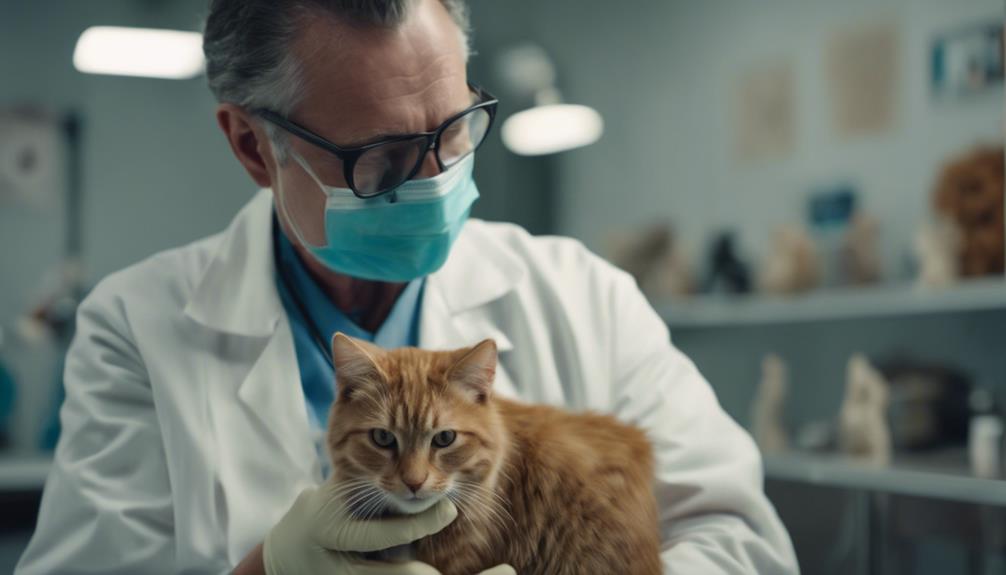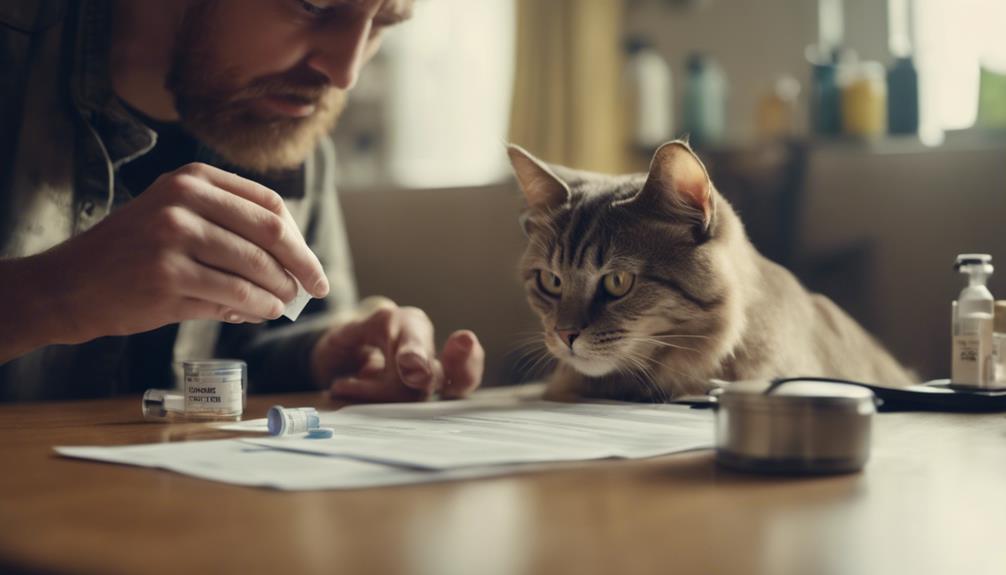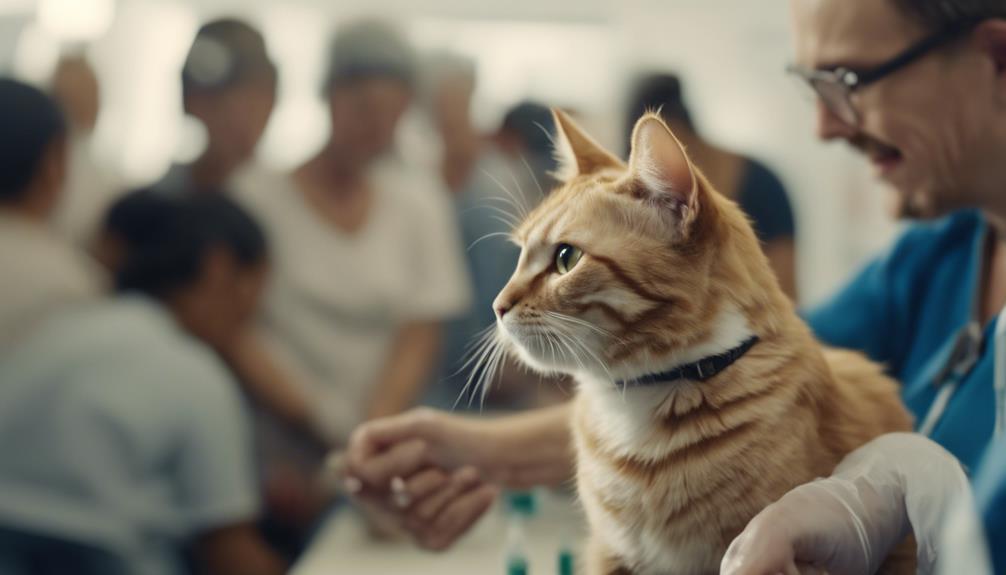The importance of the rabies vaccine for cats cannot be overstated, as it serves as a crucial safeguard for both feline health and human welfare. Beyond being a legal requirement in many jurisdictions, this vaccine acts as a vital shield against a potentially fatal disease that can have severe repercussions.
However, the benefits of this vaccination extend far beyond mere compliance, reaching into the realm of public health and safety. As we delve deeper into the reasons why this vaccine is indispensable, a broader understanding of its significance emerges, shedding light on the interconnectedness between the well-being of our feline friends and our own.
Key Takeaways
- Rabies vaccination protects cats from a deadly virus transmitted by wildlife.
- Unvaccinated cats face euthanasia or quarantine if exposed to rabies.
- Vaccination costs are affordable, with options available for financial constraints.
- Even indoor cats require the rabies vaccine due to potential exposure risks.
Rabies: A Lethal Threat to Cats
Why is rabies considered a lethal threat to cats, warranting serious attention and proactive measures to safeguard their health and well-being?
Rabies, a fatal viral disease affecting the central nervous system, poses a significant risk to felines. Cats typically contract rabies from wildlife carriers like raccoons, bats, skunks, and foxes through bites or scratches.
The virus, present in the saliva of infected animals, travels to the brain via nerves, causing deadly inflammation. While rabies can be prevented through vaccination, unvaccinated cats exposed to the virus face euthanasia or strict quarantine.
Given the potential transmission risks to humans and the devastating impact on cat health, maintaining up-to-date rabies vaccinations for feline companions is paramount for their safety and the well-being of their human counterparts.
Transmission Risks to Humans
Rabies poses a significant risk not only to cats but also to humans due to the potential transmission of the virus through various means of exposure. Humans can contract rabies through bites, scratches, or contact with infected animals' saliva. Once symptoms manifest, rabies is almost always fatal, emphasizing the importance of preventive measures.
In the United States, cats are the most common domestic animals to be diagnosed with rabies, underscoring the need for vaccination to protect both pets and their human companions. Understanding the risks associated with rabies transmission highlights the critical role that vaccination plays in safeguarding public health. By ensuring that feline friends are vaccinated, individuals can mitigate the potential threat posed by this deadly virus.
Vaccination: Preventative Measure for Cats

Vaccination against rabies is an essential preventive measure for safeguarding the health of cats and reducing the risk of transmission to humans. When you choose to vaccinate your feline companion, you are not only protecting their well-being but also contributing to public health safety. Consider the following imagery to understand the importance of rabies vaccination for cats:
- A shield of protection enveloping your cat, keeping them safe from the dangers of rabies.
- A barrier standing strong against the transmission of the deadly virus to humans.
- A guardian shield, ensuring your cat's longevity and health.
- A safety net that offers peace of mind for both you and your beloved feline friend.
- A proactive step towards a healthier future for your cat and your community.
Vaccine Schedule for Kittens
Vaccinating kittens against rabies is a crucial step in ensuring their long-term health and protection from potentially deadly infections. It is recommended that kittens receive their first rabies vaccine between 12 and 16 weeks of age, with a booster shot typically required a year after the initial vaccination. The frequency of subsequent booster shots may vary based on local laws, and additional vaccinations may be necessary if a cat encounters a potentially rabid animal. The rabies vaccine is highly effective in safeguarding cats against this lethal disease.
| Vaccine Schedule for Kittens | Timing | Notes |
|---|---|---|
| 1st Vaccine | 12-16 weeks | Initial vaccination against rabies |
| Booster Shot | 1 year after first | Follow-up to enhance immunity |
| Subsequent Boosters | Varies by law | Compliance with local regulations essential |
| Additional Vaccinations | Based on exposure | Extra shots if contact with rabid animals |
| Vaccine Effectiveness | Highly effective | Provides robust protection against rabies |
Cost Considerations for Pet Owners

When considering the financial aspect of safeguarding your feline companion's health, it is essential to understand the cost implications associated with administering the rabies vaccine.
- Vaccinating a cat against rabies costs between $15 and $35.
- Low-cost vaccination clinics or animal shelters may offer free or reduced-rate shots.
- Cost may vary depending on the vaccine product and veterinary clinic.
- Affordable options are available for pet owners facing financial barriers.
- Investing in the rabies vaccine now can save you from potential high costs associated with treating rabies in the future.
Importance for Indoor Cat Owners
For pet owners of indoor cats, ensuring the administration of the rabies vaccine is a vital aspect of responsible feline care, even in the absence of frequent outdoor exposure. While indoor cats may have lower exposure to wildlife, the risk of rabies transmission still exists through unexpected means such as wildlife entering the home or accidental escapes. Rabies, a fatal disease, can also cause animals to exhibit aggression, posing a danger even to indoor cats. The seriousness of rabies outweighs the minimal risk associated with indoor living, making vaccination essential for the well-being of both your feline companion and your household.
| Importance for Indoor Cat Owners |
|---|
| Vital for responsible care |
| Protection against unexpected exposure |
Accessibility of Low-Cost Vaccination Clinics

Accessibility to low-cost vaccination clinics plays a crucial role in ensuring widespread rabies protection for cats in communities with varying financial resources. To paint a picture of the significance and impact of these clinics, imagine:
- A single parent, relieved to find a nearby clinic offering affordable rabies shots for their beloved feline companion.
- A retiree on a fixed income, able to safeguard their cat against rabies without financial strain.
- A struggling student, grateful for the opportunity to prioritize their cat's health through accessible vaccinations.
- A community of caring individuals, coming together to ensure all cats, regardless of their owners' financial status, are protected.
- A network of low-cost clinics acting as pillars of support, promoting responsible pet ownership and public health.
Public Health Impact: Rabies Prevention
Understanding the critical role of rabies prevention in public health necessitates a comprehensive approach to vaccination and control measures. Effectively preventing rabies not only safeguards the health of your beloved feline companion but also protects your family and community. Below is a table highlighting the public health impact of rabies prevention:
| Public Health Impact | Description |
|---|---|
| Human Safety | Prevents transmission of rabies from cats to humans, reducing the risk of deadly infections. |
| Community Protection | Controls the spread of rabies within communities, ensuring overall public health safety. |
| Wildlife Conservation | Minimizes the impact of rabies on wildlife populations, preserving ecological balance. |
| Economic Benefits | Reduces healthcare costs associated with rabies treatment and control measures. |
| Global Health Security | Contributes to global efforts in eradicating rabies, promoting a safer international environment. |
Frequently Asked Questions
Can Indoor Cats Still Get Rabies Even if They Never Go Outside?
Indoor cats can still contract rabies even if they never venture outside. This can occur if a rabid animal enters the home or through accidental escapes. Vaccination is essential as rabies poses a serious health risk.
Are There Any Potential Side Effects or Risks Associated With the Rabies Vaccine for Cats?
Potential side effects of the rabies vaccine for cats include mild reactions like soreness or fever. Rare adverse events may involve allergic reactions or neurological issues. Consult your veterinarian for guidance on monitoring and managing any vaccine-related concerns promptly.
How Long Does the Rabies Vaccine Provide Protection for Cats After They Receive It?
The rabies vaccine provides protection for cats typically for one to three years after administration, depending on the vaccine type and local regulations. Booster shots are necessary to maintain immunity and safeguard against this deadly disease.
Are There Any Alternative Methods of Preventing Rabies in Cats Besides Vaccination?
While vaccination remains the primary method for preventing rabies in cats, alternative approaches like minimizing outdoor exposure, securing homes against wildlife intrusion, and prompt vet care for potential exposures can complement vaccination efforts in safeguarding feline health.
How Can Pet Owners Tell if Their Cat Has Been Exposed to a Potentially Rabid Animal and Needs Immediate Vaccination?
Pet owners should look for signs of unexplained wounds, unusual behavior, or encounters with wildlife. If there are suspicions of rabid animal exposure, immediate veterinary consultation is vital for assessment and potential rabies vaccination.
How Does the Rabies Vaccine for Cats Affect Their Eye Health?
Administering the rabies vaccine protects cats from a fatal virus without affecting their vision. It’s unrelated to “everything about feline cataracts,” which typically involves lens opacity, potentially leading to blindness. Regular vaccinations are essential for overall health, but don’t impact the development of cataracts in felines.
Conclusion
In conclusion, the rabies vaccine for cats plays a crucial role in safeguarding both feline health and public safety.
By providing essential protection against a lethal viral disease, this preventive measure not only benefits cats but also mitigates the risk of transmission to humans.
The accessibility and cost-effectiveness of this vaccine further emphasize its indispensable nature in ensuring the well-being of both cats and human populations.




